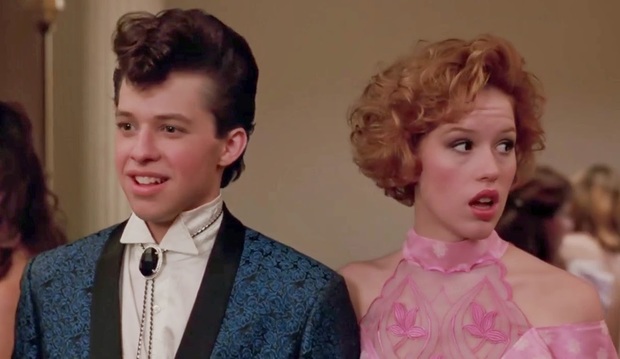|
BEFORE the recent crop of coming-of-age films such as JUNO (Jason Reitman 2007), THE PERKS OF BEING A WALLFLOWER (Stephen Chbosky 2012) and THE FAULT IN OUR STARS (Josh Boone 2014), John Hughes was the preeminent creator of teen love on screen. His representations took on and challenged teen stereotypes, creating believable and truthful characters and relationships. Three decades have passed since the release of John Hughes’ FERRIS BUELLER’S DAY OFF (1986) and PRETTY IN PINK (1986) yet their strikingly honest depictions of teenage love are timeless. Even though much has changed on a material level, his films speak to teen and young adult audiences as much as they did thirty years ago about the turmoil that is adolescence.
PRETTY IN PINK portrays an honest tale of love in high school between popular rich boy Blane (Andrew McCarthy) and social misfit Andie (Molly Ringwald), which in itself creates the first of many elements this film possesses that sets it apart from a generic teen film. This tale of love between classes quickly becomes a love triangle when Andie’s best friend Duckie (John Cryer) reveals his unrequited love for her. These two examples of confusing types of love are ones that modern audiences can connect to, in an age of multiple social media platforms and dating sites available to confess your love to the object of your affections without the fear of face-to-face rejection. Hughes addresses confusing and complicated issues surrounding love in this film in an authentic way whilst making it easily accessible to an audience with catchy music and hipster fashion. In keeping with this varied portrayal of love, it is clear from the start of FERRIS BUELLER’S DAY OFF that the maternal love shown by Ferris’s (Matthew Broderick) mother is unconditional, even if it is somewhat manipulated by him. In contrast, his best friend Cameron’s (Alan Ruck) parents are nowhere to be seen and this appears to be the norm for him. These opposing representations of family life provide a commentary on the family unit and, for those who do not have the traditional nuclear family, it is clear that family does not have to mean blood relations and it does not define you as a person. Ferris openly admits he will probably marry his girlfriend (Mia Sara), and it is with this complete sincerity and honest declaration of love that, while he might be an arrogant joker, he is also trying to live his teenage life to its fullest. Beneath the witty humour and unconventional cinematography, FERRIS BUELLER’S DAY OFF exposes the stark truth of the adolescent mind and how it feels to love, and be loved by them. Whether it is Duckie miming Otis Redding’s “Try a Little Tenderness” to Andie in an attempt to get out of the “friend zone”, Ferris’s show of fraternal love seen through the determination to help his best friend manage his anxiety, or the varied depictions of parental supervision in both films, it is clear that John Hughes efficaciously captures the discordant emotions that come with being a teenager and the perplexing relationships when it comes to teen love. No matter what decade you live in, comfort can always be sought in these timeless classics because, even though they deal with difficult relationship issues, the people watching and experiencing the issues seen on screen know that they are not alone. More short reads about LOVE >>> |


